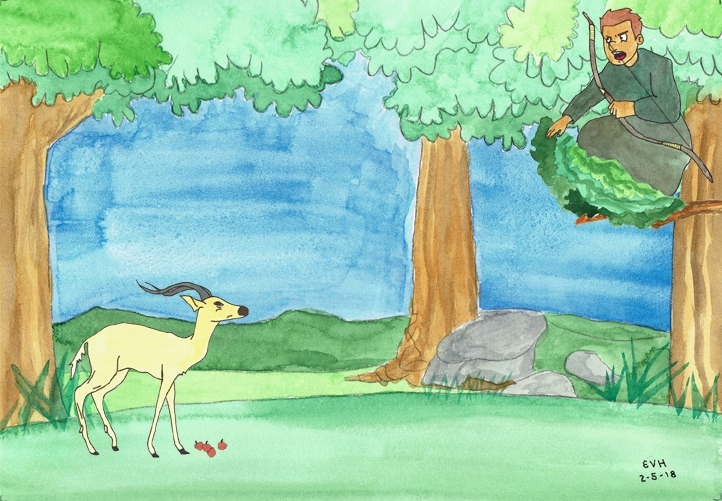
Jataka 21
Kuruṇga Jātaka
The Clever Antelope
as told by Eric Van Horn
originally translated by Robert Chalmers, B.A., of Oriel College, Oxford University
originally edited by Professor Edward Byles Cowell, Cambridge University
Here we go again with Devadatta. I wonder if he had any idea that 2,500 years after he lived his name would still be known as the embodiment of wickedness and evil!
“The antelope knows well.” This story was told by the Master while at the bamboo grove. It is about Devadatta. Once when the monks were gathered together in the Dharma Hall, they sat talking reproachfully of Devadatta, saying, “Sirs, with a view to destroy the Buddha Devadatta hired bowmen, hurled down a rock, and let loose the elephant Dhanapālaka. In every way possible he tries to kill the Lord of Wisdom.” (According to the Buddhist texts, Devadatta tried to kill the Buddha three times. The first time he hired mercenaries, the second time he tried to kill him by rolling a rock down a hill, and the third time he tried to let loose a drunken bull elephant. In this Jātaka the elephant is named Dhanapālaka; in the Vinaya account he is named Nāḷāgiri.) Entering and seating himself on the seat prepared for him, the Master asked, “Sirs, what were you discussing?”
“Sir,” they replied, “we were discussing the wickedness of Devadatta, saying that he is always trying to kill you.”
The Master said, “It is not only in these present days, monks, that Devadatta tries to kill me. He did the same thing in bygone days also. However, then as now, he was unsuccessful.” And so saying, he told this story of the past.
Once upon a time when Brahmadatta was king of Benares, the Bodhisatta was born as an antelope, and he used to live on fruits in his haunts in the forest.
At one time he was eating the fruit of a sepaṇṇi tree. (A sepaṇṇi tree is any tree that grows fruit that animals will eat.) And there was a village hunter, whose technique was to build a platform in a tree where he found the track of deer, and to wait for them to come eat the fruit. When the deer came, he shot them down with an arrow and sold the flesh for a living. One day this hunter saw the tracks of the Bodhisatta at the foot of the tree and made a platform up in that tree. Having breakfasted early, he went with his bow into the forest and climbed up onto his platform. The Bodhisatta, too, came early to eat the fruit of that tree. But he was not in too great a hurry to approach it. He thought to himself, “Sometimes these hunters build a platform for themselves in the tree limbs. Is it possible that this has happened here?” He stopped some way off to observe. Finding that the Bodhisatta did not approach, the hunter, still seated on his platform, threw fruit down in front of the antelope. The antelope said to himself, “Here’s the fruit coming down to me. I wonder if there is a hunter up there.” So he looked more closely until he saw the hunter in the tree. But pretending not to see the man, he shouted, “My worthy tree, in the past you have let your fruit fall straight to the ground, but today you have stopped acting like a tree. And since you have stopped acting like a tree, I, too, must change, and look for food somewhere else.” Having said this, he repeated this stanza:
The antelope knows well the fruit you drop.
I do not like it; I will find some other tree.

Figure: The Clever Antelope and the Angry Hunter
Then the hunter shot his arrow at the Bodhisatta, crying, “Begone! I’ve missed you this time.” Spinning around, the Bodhisatta halted and said, “You may have missed me, my good man; but depend upon it, you will not miss the results of your conduct. That is to say the eight large and the sixteen lesser hells and the five forms of bondage and torture.” With these words the antelope bounded off on its way, and the hunter, too, climbed down and went his way.
When the Master ended this discourse and repeated what he had said about Devadatta’s going about to kill him in bygone days, he showed the connection and identified the birth, by saying, “Devadatta was the hunter of those days, and I was the antelope.”
